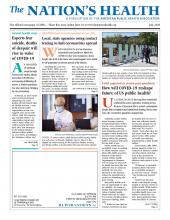
Photo by Jchizhe, courtesy iStockphoto
Food scraps make up a third of all things we throw away. But instead of sending them to rot in a landfill, there’s a better option: recycling and reusing them through composting.
Composting means taking organic things and letting them break down or decay in a specific way so they can be used again. Once your scraps have been turned into compost, it can be mixed into soil to make it more nutrient-rich. It can improve soil for your house plants or garden.
Compost is more than just leftovers from your plate — it includes things you wouldn’t eat, like pizza boxes, coffee grounds and eggshells. You might see those things as trash, but as the saying goes, one person’s trash is another person’s treasure.
“We use and we waste a lot of stuff,” says Alex Truelove, director of ZeroWaste. “So much of what we throw out is compostable, but we compost almost nothing.”
While people have saved a lot of packaging from landfills by recycling it, the same can’t be said for compostable food waste. For most people, composting isn’t as easy as putting something in a differently colored bin. So compostable waste often ends up in the trash. Only a tiny fraction of local governments have curbside composting pick-up, so chances are you will have to figure out a system for yourself.
According to the U.S. Environmental Protection Agency, a successful compost needs three basic ingredients: browns, greens and water.
• GREENS: These are your basic food scraps. It’s the parts of vegetables that you cut away. It’s your apple cores and banana peels. The greens are the fuel of your compost pile.
• BROWNS: These are most commonly found in a yard. Browns are dead leaves, branches and twigs. They bulk up your pile and you need as much of these as the greens.
• WATER: Think of compost as a living thing. It needs water to survive. Your compost shouldn’t be a soggy slop, but it shouldn’t be dry either. Putting in wet ingredients can help.
Once you have the ingredients, how do you use them? There are a few ways you can combine them to make compost.
“If you have the space, just start a big pile,” Truelove says.
It can be that easy. Find some spare ground, lay down some twigs and grass clippings and then you can start building up with equal parts green and brown fuel. Never include meat or animal bones, because that will attract unwanted attention from local wildlife. Cover it with a tarp to trap the moisture and promote healthy decay. You can also purchase or build an outdoor compost bin.
And while you don’t necessarily have to get knee deep into the science of composting, you will want to make sure you continue to balance the greens, the browns and the water.
“I don’t know about you, but I’m a big coffee drinker and if I wasn’t careful, my compost would be overwhelmed by coffee grounds and far too acidic to actually be usable,” Truelove says.
Likewise, a pile of wet cardboard isn’t going to give good results, so make sure that you mix it up. If you want to get more involved, you can find a lot of detailed resources online that can teach you how to get the most from your compost.
And if you don’t have outdoor space to spare, there are ways you can compost in your home. Start by getting a ceramic container that you can set on your kitchen counter and add scraps to as you cook and eat.
Once it’s full, you can move it to your outdoor compost pile or take it to a community collection site. In some areas, businesses will pick up your compostable waste and bring you back the final product for use in your plants, gardens and yard.
Composting is also really good for the environment. When food scraps and other compostable waste go to a landfill, they don’t get the oxygen they need to break down properly. Instead, they get trapped and then release methane into the air. So by making compost, you’re doing a double good deed!
What to put in your compost bin
You need to throw in the right ingredients to mix up a healthy batch of compost. Here are some things you should and shouldn’t include:
THROW IT IN
Fruits and vegetables
Coffee grounds and filters
Shredded newspaper
Eggshells
Cardboard
Tea bags
Paper
THROW IT OUT
Meat or fish bones or scraps
Pet waste
Cheese and dairy products
Fats, grease, lard or oils
For more helpful composting tips, visit www.epa.gov.
- Copyright The Nation’s Health, American Public Health Association









